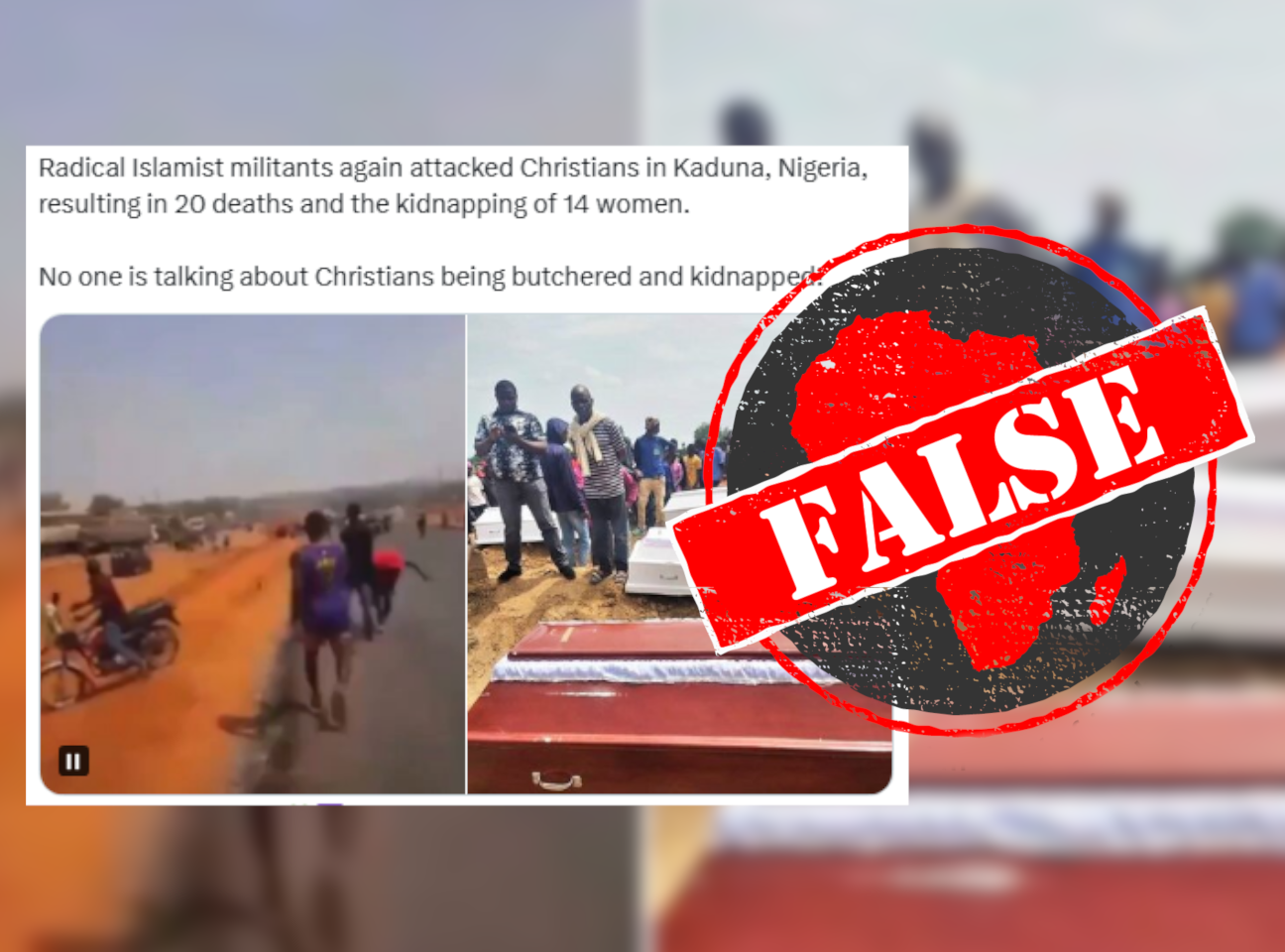IN SHORT: Several social media posts claim that an attack was staged against Christians in the Gonin-Gora area of Kaduna state in northwestern Nigeria in late February 2024. But the photo shared as evidence is old, and the video is of another attack on Gonin-Gora residents.
Radical Islamist militants have attacked Christians in Gonin-Gora in Kaduna state, northwest Nigeria, killing 20 and abducting 14 women. This is according to several posts on social media in March 2024.
One such post on X, formerly Twitter, has been viewed over 525,000 times. The post includes a video of people running towards the camera as what sound like gunshots are heard, and a photo of a number of coffins that appear to be lined up before burial.
On Facebook a similar post from 3 March reads, in part: “Nigeria: #Fulani Islamist militants attacked #Christians in Gonin Gora, Kaduna. 20 people were reportedly killed and 14 women kidnapped.”
The Facebook post includes the same video found on X and includes the hashtag #DivideNigeriaNowToSaveLives.
Part of the background to this claim is that there have been previous attacks on Christians in Nigeria. In 2022, an attack on a Catholic church in Owo, Ondo state claimed the lives of at least 50. The following year worshippers were kidnapped from a church in Kaduna.
The recent claims of an attack on Christians in Gonin Gora have been shared by different accounts on social media, including on Facebook here, here, here and here.
But is the claim true? We checked.

Photo of coffins at least two years old
Africa Check did a reverse image search on Google and found that the photo of the coffins has been online since at least 2021.
We found the photo published on a website under the headline: “Christians Slain in and Near Jos, Nigeria, including 12 Children.” The article was published on 6 September that year.
We also found the photo published on another website in 2022, again to illustrate the killing of Christians in Nigeria.
The photo does not show the coffins of Christians killed in Kaduna state in 2024.
Bandits attack Gonin-Gora
Using the video verification tool Invid, we traced the video to a YouTube page, where it was posted on 29 February. Here it was captioned: “this happen today in Kaduna army truck burn by goningora guys.”
The same video was also posted to Instagram on 29 February, urging users to pray for the people of Gonin-Gora as the area was unsafe. In another post on X on 2 March, a man and a woman in two other videos talk about a bandit attack in the area.
In other words, the video has been used in different contexts, making it difficult to establish its original context.
We traced the video of the woman speaking back to Channels Television’s X account. Channels TV posted different videos of the incident here and here. One was captioned: “Several members of the community were said to have been kidnapped, and several others were injured during the attack by bandits.”
We searched for news of recent attacks in the Gonin-Gora area and found that the Cable newspaper reported that two people were killed and an unidentified number abducted in an attack by bandits in Gonin-Gora on 28 February.
Channels TV also reported that the residents of Gonin-Gora had blocked the Abuja-Kaduna highway to protest incessant bandit attacks on their community.
This was also reported by a popular blog. According to another report, 14 people were kidnapped by the bandits while two civilian guards were killed in a shootout.
But we found no reports that the attack specifically targeted Christians.
Fact-checking allegations of attacks on specific demographic groups ensures that the right information is available to Nigerians, as unsubstantiated information can cause or worsen tensions in communities.
Republish our content for free
For publishers: what to do if your post is rated false
A fact-checker has rated your Facebook or Instagram post as “false”, “altered”, “partly false” or “missing context”. This could have serious consequences. What do you do?
Click on our guide for the steps you should follow.
Publishers guideAfrica Check teams up with Facebook
Africa Check is a partner in Meta's third-party fact-checking programme to help stop the spread of false information on social media.
The content we rate as “false” will be downgraded on Facebook and Instagram. This means fewer people will see it.
You can also help identify false information on Facebook. This guide explains how.


Add new comment